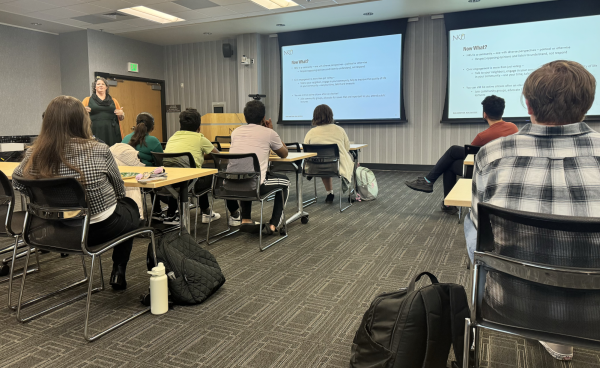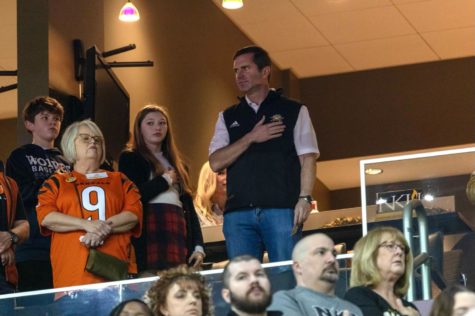Northern Kentucky University was recognized as one of the most engaged campuses for college student voting in the 2024 election.
This recognition was given by ALL IN Democracy Challenge, a non-partisan group that seeks to foster civic and democratic engagement.
NKU was listed among nearly 400 institutions from around the country. The only other public, four-year university in Kentucky to be recognized was the University of Louisville. In the Greater Cincinnati region, the University of Cincinnati also received the honor.
This achievement was recognized at the final Victor Talks of the semester on Monday evening. The event was sponsored by the Scripps Howard Center for Civic Engagement in partnership with the Student Government Association.

Shauna Reilly, who oversees the Center for Civic Engagement and is a political behavioralist, was the speaker at Monday night’s discussion, which reflected on the results of the election from the presidential level to the regional level. Reilly was also part of a faculty panel earlier in the semester prior to the presidential debate.
For the presidential election in Kentucky, the turnout of voters was fairly high at 59% (3.5 million votes), Reilly said. In comparison, the vote turnout for the entire country was 64.5% (158 million).
When it came to the issues voters found most important, the economy was at the number one spot. Democracy and national security followed suit in the second and third spots, according to the data presented on Monday night.
The U.S. Senate and House of Representatives both turned Republican as a result of the election, which can make it interesting for states like Kentucky that have a Democratic governor but Republican legislators.
During the question and answer portion of Monday night’s Victor Talks, a student asked Reilly who she thinks might be nominated for the Democratic party when 2028’s presidential election rolls around.
“I think it’ll be Andy Beshear,” Reilly answered.
She cited the previous point that in Beshear’s next three years as governor, he will have the opportunity to either sit as a “lame duck,” or campaign and make himself a national figure.

Beshear already made headlines when he published an op-ed in The New York Times on Nov. 12, writing about how Democrats can turn around and win again after the 2024 presidential election loss.
He was also considered to be Democratic presidential nominee Kamala Harris’ vice-presidential running mate, while the role ultimately went to Minnesota Governor Tim Walz.
“They mentioned Kentucky for the first time—about a Democrat—in a long time,” Reilly said.
Looking at issues that were on the Nov. 5 ballot in Kentucky, Amendment 1 and Amendment 2 were hot topics. Amendment 1, which passed, will add language to the Kentucky State Constitution explicitly stating that noncitizens can not vote in elections. Federal law already prohibits noncitizens from voting in federal elections.
Amendment 2, while it did not pass, sought to add language to the Kentucky State Constitution making it possible for the General Assembly to provide public funding for non-public schools.
Amendment 1 had zero dollars spent on advertising for the issue, according to Reilly.
“Not one dollar was spent for or against this measure,” Reilly said. “Why put something on the ballot if you don’t want to campaign about what it is or tell people what it’s about?”
Some students cited that federal law already covered the issue, so the amendment was redundant. Some cited that the language was confusing and perhaps was meant to mislead voters.
Amendment 2, however, had $10 million spent: $8 million against the issue and $2 million for it.
“It’s almost like you could pay for something out of that [$10 million],” Reilly said. “…Not that I think you shouldn’t spend money on elections.”
In Northern Kentucky, medical cannabis was on the ballot in many cities, including Alexandria, Florence, Independence and Union, among others.
Every Northern Kentucky city that put medical cannabis on the ballot voted to allow it. Beshear spoke out about the results following the election.
“This signals what we have known for a long time, which is that the jury is no longer out on medical cannabis,” Beshear said. “Kentuckians want their families, friends and neighbors who have serious medical conditions like cancer, multiple sclerosis or PTSD to have safe and affordable access.”
After a lengthy question and answer session, the Victor Talks wrapped up for the final time of the semester. Throughout the fall, sessions on political communication, race and the election and economics were discussed with NKU faculty and students.


